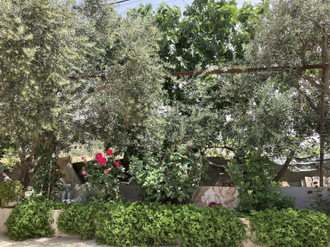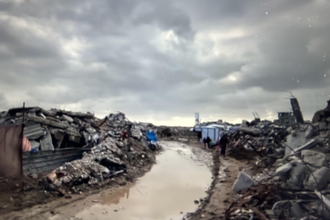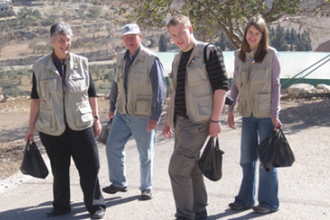Letter from the Holy Land - 2

Noor's garden. Image M Nazareth
Melanie Nazareth has recently returned from Israel and occupied Palestine where she spent two and a half months with the Ecumenical Accompaniment Programme in Palestine and Israel.
My last letter told the story of Ahmed and displacement of his community as a result of violence and harassment by settlers who want to drive people off the land and expand the settlements. The family whose story I will tell in this letter faces dispossession by the occupying authority - by the state itself - in contravention of its obligations under international law.
As Israeli human rights organisation B'Tselem says "Israeli policy prevents almost any Palestinian construction in the West Bank." (see: https://statistics.btselem.org/en/intro/demolitions ). It is almost impossible to get the necessary permits to construct anything, so you cannot put an extension, build upwards or build a new house on your land in the West Bank. When Palestinians build structures anyway, as they have no choice, for example as families expand, they are issued with demolition orders by the Israeli authority, with no idea of when the demolition will be carried out. Arbitrary demolition is in violation of international law. It is another way that life lived under the military occupation is uncertain, arbitrary and economically disadvantaged.
Some weeks ago I met a woman called *Noor. Her husband died a couple of years ago and she now lives alone with her seven children in a two bedroom room home, although her stepson lives in an outbuilding just outside the gate to give her some protection. Her house has a small living room and a bathroom and an outside kitchen - not so good when it rains she says. This is her story.
Noor is a resourceful woman, her home is clearly a place of love, and she has planted roses and geraniums in a raised bed that she built herself. The little garden area is a beautiful space and helps to shield their home from the road up to the settlement. The road to the settlement was once a place where they grew fruit trees and olive trees.There are a few remaining trees in the couple of metres between her flowers and the road. The olive trees, she says are more than 40 years old. Not old for an olive tree, but old enough to have been there before she came to live on that land.
The land belongs to her husband's family - she came when she married him, to a one room house with a beaten earth floor. That's how it was for six years until with a growing family they made improvements. The house had to be built without a permit so it is subject to a demolition order. And later, making the house bigger attracted a second demolition order. Noor wants to put an awning over the courtyard area but that would also require an unobtainable permit. The demolition orders hang over the family. If, or more likely when, the orders are enforced, they may get only a few hours, less if the soldiers feel ungenerous, to collect their belongings. Some of the neighbouring houses and a local cafe were demolished a month ago and five families lost their homes. Those families are now living in a local refugee camp. We asked Noor where she and the children would go if the house was demolished. She said "I have no plans if this happens. All the families have this story, my husband's family also have a demolition order. There is no room." She reflected for a moment and said she would live in a tent in the same place to keep the land, because if she leaves, the state or the settlers, it amounts to the same thing for her, would take the land.
Noor is now worried about another, possibly more immediate threat. In the days before we met, soldiers came to her home to measure for a road widening project to make a faster road to the expanding settlement. This would remove the remaining trees and encroach on her garden. It does not seem that there is anything she can do to stop this confiscation of her land. She is anxious what this means for the house, and about cars speeding along the road her children have to cross to walk to school.
We asked Noor about her dreams for the future. She said she just wanted to be able to live peacefully and safely and to be able to be able to build onto her house so that, in the traditional way, her sons when they were grown up could live there with their wives.
B'Tselem have recorded ( https://statistics.btselem.org/en/demolitions/pretext-unlawful-construction ) 572 house demolitions in the West Bank so far this year that were carried out on basis the construction was without permission. B'Tselem's figures show that 558 people have been left homeless as a result of those demolitions, 288 of whom are children. Not all structures that are demolished are homes, some are businesses providing a livelihood for multiple people. In the week after I met Noor, in another village, a man showed me the remains of his demolished car wash, on which 13 people were dependent.
There's one more person whose story I want to add in this letter. I mentioned earlier Noor's stepson, who has stepped in to provide a protective presence for the family. He is just 22 years old. He has a healing bullet wound in his abdomen. He shrugs in a resigned kind of way when asked about it, and pulls up a corner of his shirt to shows two newly forming scars, one on his front where the bullet entered and one on the the back where it exited. He recounts how in mid April he was out doing some shopping for the family, when he came upon a group of soldiers. He, like every young man you talk to here, was afraid of being arbitrarily arrested. We know from conversations, photographs and videos, that it is at best a degrading experience where detainees are blindfolded and their wrists zip tied, often they report being beaten. In fear, Noor's stepson decided to run away. With hindsight it was a bad decision, because the soldiers shot him.
LINKS
BADIL Resource Center for Palestinian Residency and Refugee Rights: https://badil.org
Ecumenical Accompaniment Programme in Palestine and Israel: www.quaker.org.uk/action/palestine-and-israel/eappi

















